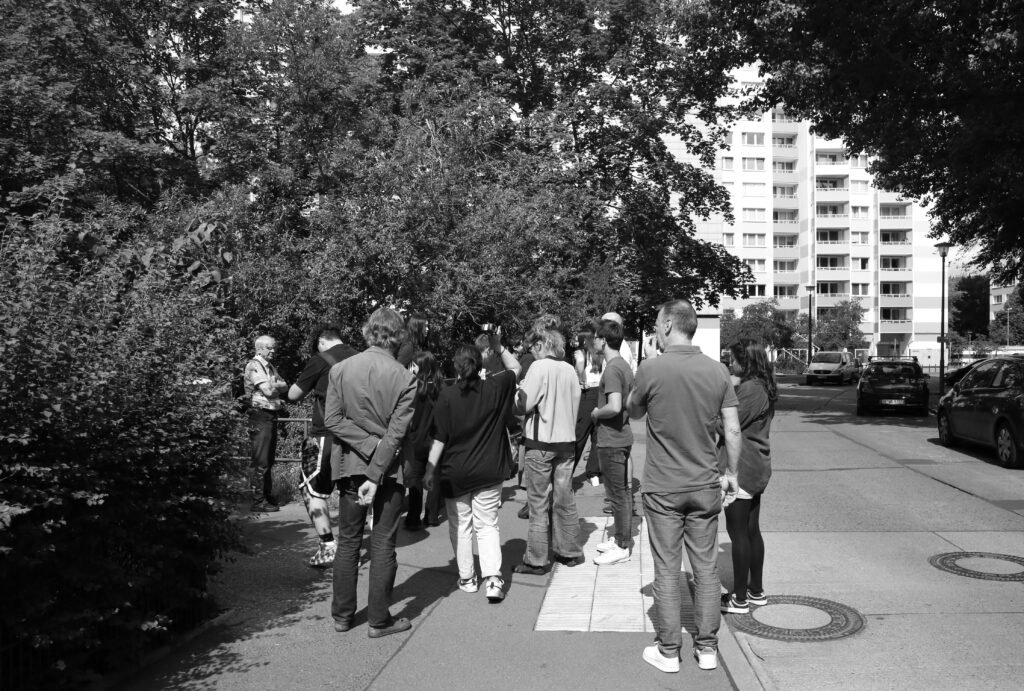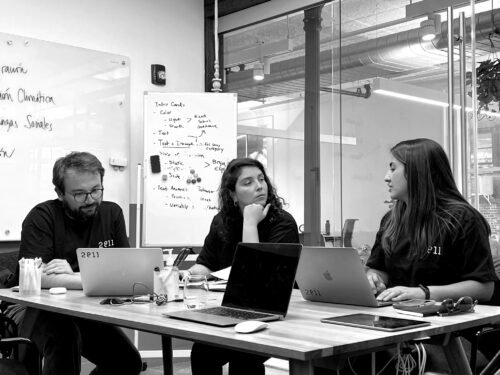
Recognizing the importance of engaging young people in addressing our current environmental challenges, 2811, along with its partner Via Austroboreal, held its first-ever Climate Justice Camp in Berlin at the start of July. This two-day event, supported by the All in for Berlin Ecosia grant, Grün Berlin and the Senatsverwaltung für Umwelt, Mobilität, Verbraucher- und Klimaschutz (Berlin Ministry for Environment, Mobility, Consumer and Climate Protection), this project pioneered how to involve schools, teachers and students in local climate adaptation and mitigation initiatives.
Focusing on specific environmental and climate-related issues, such as air pollution and the urban heat island effect, the camp provided a platform for 28 students aged 14 and 15 to explore, learn, and develop innovative solutions in the context of climate action. Moreover, this camp aimed to inspire and educate young individuals on sustainable solutions for a better world by fostering an understanding of climate change and encouraging local action.
The Climate Justice Camp Berlin started by reflecting on a couple of essential basic concepts related to climate change; the participant students explored their understanding of climate, weather, the greenhouse effect, and its consequences. The event offered interactive sessions that facilitated the exploration of climate change impacts, including identifying major emitting countries and possible solutions.
“Climate Justice needs to be explained to youth. It is not self-evident”, explained Volker Schlickum from the Berlin Ministry of Environment during the event. Also, providing a comprehensive introduction to climate justice, the camp instilled a sense of responsibility in the participants to address the injustices caused by the climate crisis.

Challenge-Based Learning
The central part of the camp focused on challenge-based learning, which allowed the students to address real-world problems related to air pollution and climate change. The students participated in activities such as measuring air pollution and temperature with sensors. This data-driven approach provided them with a tangible connection between theory and practice, enabling the students to analyze the results collaboratively and develop innovative solutions.
Also, the Climate Justice Camp Berlin offered a space for discussions and co-creation of solutions. The camp enabled participants to examine the injustices of the climate crisis in their communities and beyond. The camp nurtured its passion and commitment towards sustainable action by offering a safe and engaging environment.
In its two days, the camp went beyond discussing the challenges and consequences of climate change. It also focused on green living and sustainable options, equipping students with practical knowledge to make environmentally conscious choices in their daily lives.
Creative problem-solving sessions during the p inspired students to think critically and develop innovative solutions to reduce their ecological footprint. Additionally, the camp emphazised the importance of youth action and advocacy, empowering participants to be agents of change and amplifiers of sustainable practices.

Youth Empowerment and Collaboration
Climate Justice Camp Berlin allowed students to exchange local stories and insights from Berlin. By sharing their experiences and challenges, participants gained a broader perspective on climate change’s local impact. Moreover, the camp encouraged students to think creatively by developing climate-focused stories, harnessing their understanding of the crisis, and showcasing potential pathways to combat it.
The event provided an empowering and educational experience for young students, equipping them with the knowledge, skills, and motivation to learn about climate change and take action against it. With the camp, the students are better equipped to impact their communities and advocate for global change positively.
“It is important for people to know and understand what climate justice means. Schools should implement more of these kinds of projects since teachers are allowed to integrate climate change into their agenda”, said Andreas Kerschbaumer from the Berlin Ministry of Environment during the event.
The camp stands as a testament to the power of youth action and emphasises the vital role that young individuals play in shaping a sustainable world. Together, they can create a brighter future for our planet and inspire others to join the movement for climate justice.
Related Posts
Collaboration between universities: a formula for social innovation
Education is key to boosting innovation. This is where universities and their possible common spaces come in.
Read moreEducation and technology: a powerful mix for planetary regeneration
If climate change is a major planetary event, how do you better educate the next generation of change agents?
Read moreIn this way, social innovation can produce impact projects
Innovation can give us unprecedented proposals and impact projects; also open ourselves to new perspectives and horizons.
Read more


